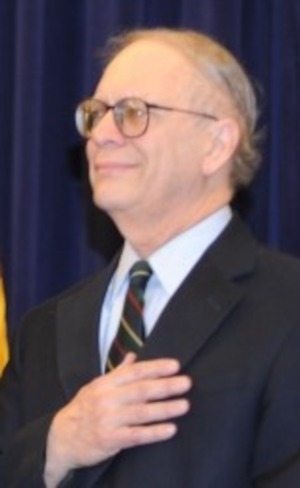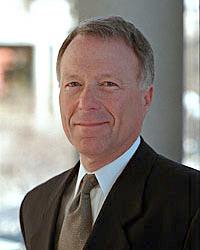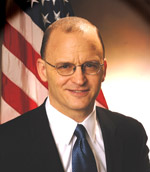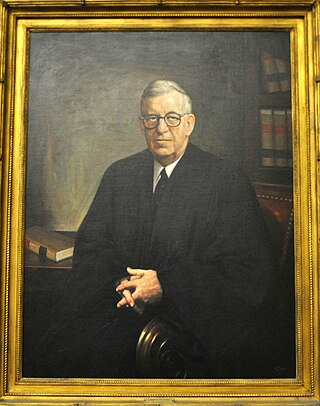
Kenneth Winston Starr was an American lawyer and judge who as independent counsel authored the Starr Report, which served as the basis of the impeachment of Bill Clinton. He headed an investigation of members of the Clinton administration, known as the Whitewater controversy, from 1994 to 1998. Starr previously served as a federal appellate judge on the U.S. Court of Appeals for the District of Columbia Circuit from 1983 to 1989 and as the U.S. solicitor general from 1989 to 1993 during the presidency of George H. W. Bush.

The Federalist Society for Law and Public Policy Studies (FedSoc) is an American conservative and libertarian legal organization that advocates for a textualist and originalist interpretation of the U.S. Constitution. Headquartered in Washington, D.C., it has chapters at more than 200 law schools and features student, lawyer, and faculty divisions; the lawyers division comprises more than 70,000 practicing attorneys in ninety cities. Through speaking events, lectures, and other activities, it provides a forum for legal experts of opposing conservative views to interact with members of the legal profession, the judiciary, and the legal academy. It is one of the most influential legal organizations in the United States.

The United States Court of Appeals for the Second Circuit is one of the thirteen United States Courts of Appeals. Its territory covers the states of Connecticut, New York, and Vermont, and it has appellate jurisdiction over the U.S. district courts in the following federal judicial districts:

Speculation abounded over potential nominations to the Supreme Court of the United States by President George W. Bush since before his presidency.
Webster Lee "Webb" Hubbell is a former United States Associate Attorney General from 1993 to 1994 who as part of the Whitewater controversy pled guilty to one count of wire fraud and one count of failing to disclose a conflict of interest, and was sentenced to 21 months in prison.
A law clerk, judicial clerk, or judicial assistant is a person, often a lawyer, who provides direct counsel and assistance to a lawyer or judge by researching issues and drafting legal opinions for cases before the court. Judicial clerks often play significant roles in the formation of case law through their influence upon judges' decisions. Judicial clerks should not be confused with legal clerks, court clerks, or courtroom deputies who only provide secretarial and administrative support to attorneys and/or judges.

John Glover Roberts Jr. is an American jurist serving since 2005 as the 17th chief justice of the United States. He has been described as having a moderate conservative judicial philosophy, though he is primarily an institutionalist. Regarded as a swing vote in some cases, Roberts has presided over an ideological shift toward conservative jurisprudence on the high court, in which he has authored key opinions.

David Bryan Sentelle is a Senior United States circuit judge of the United States Court of Appeals for the District of Columbia Circuit. He previously was a U.S. district judge on the United States District Court for the Western District of North Carolina from 1985 to 1987.

Steve Coll is an American journalist, academic, and executive.
Theodore Von Wells, Jr. is an American trial lawyer and defense attorney. He is a partner at the New York law firm of Paul, Weiss, Rifkind, Wharton & Garrison, where he is co-chair of its litigation department. For his practice in white-collar criminal cases, he has been considered one of the most prominent litigators in the United States.

Michael Boudin is a former United States circuit judge of the United States Court of Appeals for the First Circuit. He served as Chief Judge of that court from 2001 to 2008. Before his service on the First Circuit, he was a United States District Judge of the United States District Court for the District of Columbia. He was elected to the American Philosophical Society in 2010.
William Peter Tavoulareas was a Greek-American petroleum businessman who served as President and Chief Executive of the Mobil Corporation in the 1970s and 1980s. He was best known for his libel lawsuit against The Washington Post, responding to the newspaper's investigative journalism articles criticizing him.

Baker Botts L.L.P. is an American law firm headquartered in Houston, Texas, at One Shell Plaza. It has approximately 725 lawyers and primarily handles matters involving technology and energy companies. It is the second-oldest law firm west of the Mississippi.
John C. Coughenour is a senior United States district judge of the United States District Court for the Western District of Washington. Before being appointed as a judge, Coughenour was a leading litigator with Bogle and Gates and has taught trial and appellate practice at the University of Washington School of Law.

Irve Lewis "Scooter" Libby is an American lawyer and former chief of staff to Vice President Dick Cheney known for his high-profile indictment and clemency.

Gregory G. Garre is an American lawyer who served as the 44th United States Solicitor General from June 19, 2008, to January 16, 2009. He is currently a partner at Latham & Watkins, a private law firm.

Elijah Barrett Prettyman was a United States circuit judge of the United States Court of Appeals for the District of Columbia Circuit. His son was American attorney E. Barrett Prettyman Jr.

On August 25, 2017, President Donald Trump pardoned Joe Arpaio for criminal contempt of court, a misdemeanor. Arpaio had been convicted of the crime two months earlier for disobeying a federal judge's order to stop racial profiling in detaining "individuals suspected of being in the U.S. illegally". The pardon covered Arpaio's conviction and "any other offenses under Chapter 21 of Title 18, United States Code that might arise, or be charged, in connection with Melendres v. Arpaio." The official White House statement announcing the grant of clemency described Arpaio as a "worthy candidate" having served the nation for more than fifty years "protecting the public from the scourges of crime and illegal immigration."
Mark Floyd Pomerantz is an American attorney. He is a member of the New York law firm Paul, Weiss, Rifkind, Wharton & Garrison, generally referred to as Paul, Weiss. In February 2021, he left that firm to assist with the Manhattan District Attorney's investigation into the finances of former president Donald Trump until his resignation from the case in February 2022.
Robyn Dixon is a journalist and Moscow bureau chief for The Washington Post.












